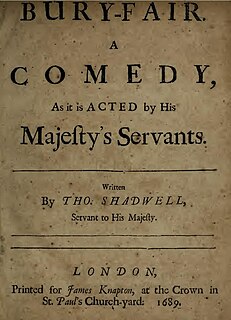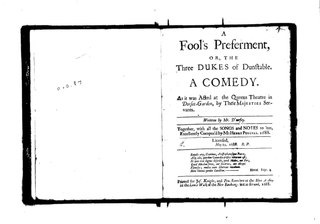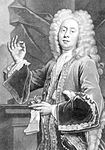Related Research Articles
The Royalist is a 1682 comedy play by the English writer Thomas D'Urfey. It was staged at the Dorset Garden Theatre by the Duke's Company, shortly before the merger that created the United Company. It is set during the Commonwealth Era following the English Civil War.
The Country Wit is a 1676 comedy play by the English writer John Crowne, part of the tradition of Restoration Comedy. It was first staged at the Dorset Garden Theatre in London by the Duke's Company. The cast included Samuel Sandford as Sir Thomas Rash, Thomas Betterton as Ramble, James Nokes as Sir Mannerly Shallow, Henry Harris as Merry, Cave Underhill as Booby, Matthew Medbourne as Lord Drybone, Anthony Leigh as Rash, Mary Betterton as Lady Faddle, Mary Lee as Christina, Elizabeth Currer as Betty Frisque and Elinor Leigh as Isabella.

Dame Dobson is a 1683 comedy play by the English writer Edward Ravenscroft.
The Counterfeits is a 1678 comedy play by the English writer John Leanerd. It was staged by the Duke's Company at the Dorset Garden Theatre with a cast that included Anthony Leigh as Don Gomez, Thomas Gillow as Don Luis, Thomas Betterton as Vitelli, Henry Harris as Antonio, Matthew Medbourne as Carles, William Smith as Peralta, Thomas Percival as Dormilon, Cave Underhill as Fabio, Joseph Williams as Crispin, John Richards as Tonto, Mary Lee as Elvira, Emily Price as Violante and Anne Shadwell as Flora.

The Counterfeit Bridegroom; Or, The Defeated Widow is a 1677 comedy play. The work's authorship is usually credited to Aphra Behn has been alternatively been attributed to Thomas Betterton. It was inspired by Thomas Middleton's Jacobean play No Wit, No Help Like a Woman's.
A Duke and No Duke is a 1684 comedy play by the Irish writer Nahum Tate. It was originally staged by the United Company at the Drury Lane Theatre in London with a cast including John Wiltshire as Lavinio, Thomas Gillow as Barberino, Joseph Williams as Alberto, Anthony Leigh as Trappolin, Thomas Percival as Mago, Elizabeth Currer as Isabella and Susannah Percival as Prudentia.
The Marriage-Hater Matched is a comedy play by the English writer Thomas D'Urfey. It was first staged by the United Company at the Theatre Royal, Drury Lane in January 1692. The original cast included John Bowman as Brainless, William Mountfort as Sir Philip Freewit, Samuel Sandford as Limber, John Hodgson as Darewell, Anthony Leigh as Myn Here Van Grin, George Bright as Bias, Thomas Doggett as Solon, William Bowen as Callow, Colley Cibber as Splutter, Elizabeth Barry as Lady Subtle, Katherine Corey as Lady Bumfiddle, Anne Bracegirdle as Phoebe, Charlotte Butler as La Pupsey and Abigail Lawson as Margery.
Love For Money; Or, The Boarding School is a 1691 comedy play by the English writer Thomas D'Urfey. It was originally staged at the Theatre Royal, Drury Lane by the United Company. In 1733 it was adapted into a ballad opera The Boarding School by Charles Coffey.

The She-Gallants is a 1695 comedy play by the English writer George Granville. It was first staged by Thomas Betterton's Company at the Lincoln's Inn Fields Theatre in London.

The Comical Revenge; Or, Love In A Tub is a 1664 comedy play by the English writer George Etherege. First staged by the Duke's Company, it premiered at the Lincoln's Inn Fields Theatre. It is one of the earliest Restoration Comedies.
Friendship in Fashion is a 1678 comedy play by the English writer Thomas Otway. It was first staged by the Duke's Company at the Dorset Garden Theatre in London. It was part of the trend of Restoration Comedy that flourished during the era.

She Would If She Could is a 1668 comedy play by the English writer George Etherege. It was originally staged at the Lincoln's Inn Fields Theatre by the Duke's Company.
The Cheats of Scapin is a 1676 comedy play by the English writer Thomas Otway. It was an adaptation of the French play Scapin the Schemer by Molière. It premiered at the Dorset Garden Theatre performed by the Duke's Company as an afterpiece to Otway's new tragedy Titus and Berenice.
The Maid's Last Prayer: Or, Any Rather Than Fail is a 1693 comedy play by the Irish writer Thomas Southerne. It was first staged at the Theatre Royal, Drury Lane by the United Company.

The Fortune Hunters; Or, Two Fools Well Met is 1689 comedy play by James Carlile. It was originally staged by the United Company at the Theatre Royal, Drury Lane in London.

Bury Fair is a 1689 comedy play by the English writer Thomas Shadwell. It is part of the tradition of Restoration Comedy that flourished during the era. It was first staged by the United Company at the Theatre Royal, Drury Lane in London.
Cuckold's Haven; Or, An Alderman No Conjurer is a 1685 comedy play by the Irish writer Nahum Tate. It was first staged at the Dorset Garden Theatre in London by the United Company. It was a reworking of George Chapman, Ben Jonson and John Marston's Eastward Ho.

Madam Fickle; Or, The Witty False One is a 1676 comedy play by the English writer Thomas D'Urfey. It was first staged at the Dorset Garden Theatre by the Duke's Company.

A Fool's Preferment; Or, The Three Dukes Of Dunstable is a 1688 comedy play by the English writer Thomas D'Urfey. It is a reworking of John Fletcher's Jacobean work The Noble Gentleman. It was first performed by the United Company at the Dorset Garden Theatre in London. Henry Purcell composed the play's incidental music. It was his first major work composingfor the theatre in seven years since Sir Barnaby Whigg.
The Devil of a Wife, or A Comical Transformation is a 1686 comedy play by the English writer and actor Thomas Jevon. It was first performed by the United Company at the Dorset Garden Theatre in London.
